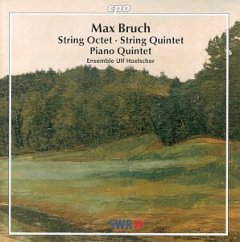Max Bruch – Chamber Music - Piano Quintet-String Music (1999)
Max Bruch – Chamber Music - Piano Quintet-String Music (1999)

String Octet, Op. posth. (1920) 1. Allegro Moderato 2. Adagio 3. Allegro Molto Piano Quintet in G minor, Op. posth. (1886) 4. Allegro Molto Moderato 5. Adagio 6. Scherzo 7. Finale. Allegro Agitato String Quintet in A minor, Op. posth. (1918) 8. Allegro 9. Adagio Molto 10. Adagio Non Troppo 11. Allegro Ensemble Ulf Hoelscher
This disc surveys a fair percentage of Max Bruch's chamber music output. Unlike piano music, Bruch seems to have had no antipathy to chamber music (though understandably, the piano rarely features in his chamber works). Even so, he produced little over the course of his long life. As a child, he wrote a strikingly precocious septet, and while a student of Ferdinand Hiller produced a series of piano trios and a bit later, string quartets. He then turned his attention to opera, orchestral music, and choral music, where he found his true calling. At least, he was encouraged by his contemporaries to think so. Today, of course, Bruch is best known for his orchestral music with violin. His choral music is slowly being rediscovered, but his chamber music is virtually unperformed, and recordings of this music rarely hang around long in the catalogue.
Kudos, then, to CPO for bringing us the current selection of works from the middle and end of Bruch's creative life. The Piano Quintet is a curious affair. Written at the request of English musical amateurs, the work was begun while Bruch served as conductor of the Liverpool Philharmonic (1880-83) and was finally completed after he returned to Germany. It is dramatic, almost stormy, despite the fact that it predictably makes no great demands on the performers. Still, amateurs would have to be both competent and confident to bring off the fleet third movement scherzo.
The other works have greater substance. The Octet of 1920, the last year of Bruch's life, starts with a radiant sonata allegro based on two lovely, typically Bruchian themes. The slow movement has the tinge of melancholy that flavors many of the composer's slow movements, while the finale is a buoyant piece that sails confidently along. It sounds a lot like the last movement of Bruch's Third Symphony, penned about thirty-five years earlier, and represents not a minute's worth of advance in Bruch's musical thinking over all those years.
The same is true of the String Quintet, one of two such works from 1919. It could just as easily have been penned in the 1880s. Here, the slow movement, based on a movement from Bruch's 1912 Serenade for string orchestra, is the emtional heart of the work. Bruch successfully expands his earlier effort into a movement of tender beauty.
All these works are deserving of live performance, especially the robust and youthful-sounding Octet. But besides the conservatism of Bruch's idiom, another issue that has probably kept performers at arm's length from the two pieces for strings is the fact that the first violinist has the lion's share of work to do, and no ordinary violinist need apply for this job. Fortunately, CPO offered the job to violin virtuoso Ulf Hoelscher and his ensemble. With Hoerlscher, who's had a distinguished solo career, at the helm, Bruch's music gets the kind of performance it deserves.
There is much lovely music here, beautifully played and recorded. If you need to, just pretend the two late works were written when Arnold Schoenberg was still in knee pants, and enjoy. Enjoy. --- M. C. Passarella, amazon.com
download (mp3 @320 kbs):
uploaded yandex 4shared mediafire mega solidfiles zalivalka cloudmailru filecloudio anonfiles oboom
